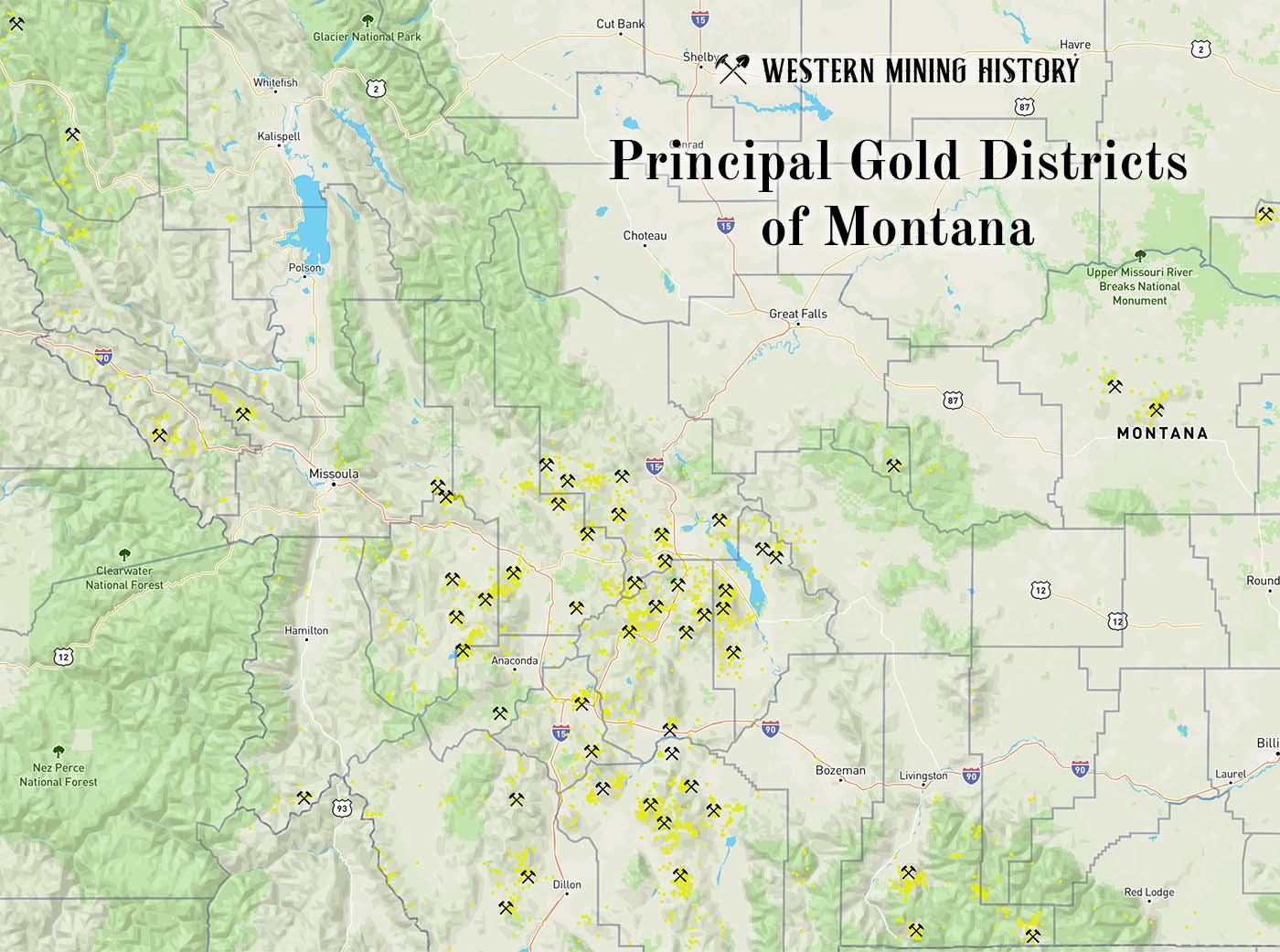The Blue - Eyed Maggie Mine is a lead, gold, and silver mine located in Powell county, Montana at an elevation of 6,099 feet.
About the MRDS Data:
All mine locations were obtained from the USGS Mineral Resources Data System. The locations and other information in this database have not been verified for accuracy. It should be assumed that all mines are on private property.
Mine Info
Elevation: 6,099 Feet (1,859 Meters)
Commodity: Lead, Gold, Silver
Lat, Long: 46.37528, -112.58278
Map: View on Google Maps
Blue - Eyed Maggie Mine MRDS details
Site Name
Primary: Blue - Eyed Maggie Mine
Commodity
Primary: Lead
Primary: Gold
Primary: Silver
Secondary: Antimony
Secondary: Zinc
Secondary: Copper
Tertiary: Arsenic
Location
State: Montana
County: Powell
District: Emery (Zosell) District
Land Status
Land ownership: National Forest
Note: the land ownership field only identifies whether the area the mine is in is generally on public lands like Forest Service or BLM land, or if it is in an area that is generally private property. It does not definitively identify property status, nor does it indicate claim status or whether an area is open to prospecting. Always respect private property.
Holdings
Not available
Workings
Not available
Ownership
Owner Name: Higgins, James
Home Office: Deer Lodge, Montana
Production
Not available
Deposit
Record Type: Site
Operation Category: Past Producer
Operation Type: Unknown
Year First Production: 1910
Discovery Year: 1897
Discovery Method: Ore-Mineral In Place
Years of Production:
Organization:
Significant: N
Deposit Size: S
Physiography
General Physiographic Area: Rocky Mountain System
Physiographic Province: Northern Rocky Mountains
Mineral Deposit Model
Not available
Orebody
Form: TABULAR
Structure
Type: R
Description: Boulder Batholith
Type: L
Description: Fault 40 Ft. W Of Main Workings - Strikes N 15 W Dips 60 E. An E - W Fracture Strikes N 70 E Dips 75 Nw.
Alterations
Alteration Type: L
Alteration Text: Silicification & Oxidation, Hydrothermal
Rocks
Name: Tuff
Role: Associated
Age Type: Host Rock
Age Young: Late Cretaceous
Name: Tuff
Role: Associated
Age Type: Associated Rock Unit
Age Young: Late Cretaceous
Name: Tuff
Role: Associated
Age Type: Associated Rock
Age Young: Late Cretaceous
Analytical Data
Analytical Data: AS: 3-21%
Analytical Data: FE: 11-18%
Analytical Data: MN: 2-3.5%
Analytical Data: CU: 0.1-0.5%
Analytical Data: ZN: TO 6%
Analytical Data: PB: 2-6%
Analytical Data: AG: 42-63 OZ/TON
Analytical Data: AU:1-1.5 OZ/TON
Materials
Ore: Chalcopyrite
Ore: Tetrahedrite
Ore: Boulangerite
Ore: Gold
Ore: Sphalerite
Ore: Galena
Gangue: Pyrite
Gangue: Quartz
Gangue: Stibnite
Comments
Comment (Deposit): THE VEIN IS CONTAINED WITHIN WELL-DEFINED WALLS. A MINOR FAULT TRENDING N 70 E AND DIPPING 75 NW DISPLACES THE VEIN ABOUT 1 FT. ABOUT 40 FT W OF MAIN WORKINGS ANOTHER FAULT, STRIKE N 15 W AND DIP 60 E, DISPLACES THE VEIN 22 FT. OXIDIZED OR IS RICHER IN AU, AG AND PB. THE WALL ROCK WAS HYDROTHERMALLY ALTERED AND INTRODUCED THE SULFIDE MINERALS. THE VEIN HAS A DIP LENGTH OF 200 FT.
Comment (Location): N SIDE OF ROCKER GULCH JUST BELOW THE FLAT. ; INFO FROM LAND.ST :(1959)
Comment (Reserve-Resource): THE INTERSECTION OF THE SWAN-SABBATH DAY VEIN WITH THE BLUE EYED MAGGIE OR EMERY VEIN MIGHT BE INVESTIGATED.
Comment (Production): PRODUCTION YEARS 1910-1941
Comment (Workings): 170 FT ADIT INCLINED 8-10 DEG WITH DRIFTS W AND N ALONG FAULT. 2 ADITION ADITS, 4 LEVELS, A WINZE.
Comment (Geology): LOW ANGLE REVERSE FAULTS
Comment (Deposit): Discovery Year: LATE 1890'S - EARLY 1900'S
References
Reference (Production): USGS BULL 842, P. 277; MBMG BULL 98, P. 57.
Reference (Deposit): USGS BULL 842, P. 277-79.
Reference (Deposit): MBMG MEM 34
Reference (Deposit): MBMG BULL 98, P. 18, 19, 57.
Principal Gold Districts of Montana

In Montana, 54 mining districts have each have produced more than 10,000 ounces of gold. The largest producers are Butte, Helena, Marysville, and Virginia City, each having produced more than one million ounces. Twenty seven other districts are each credited with between 100,000 and one million ounces of gold production. Read more: Principal Gold Districts of Montana.